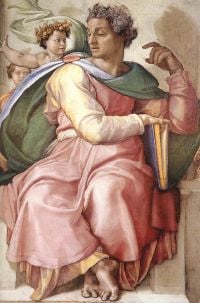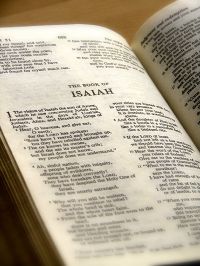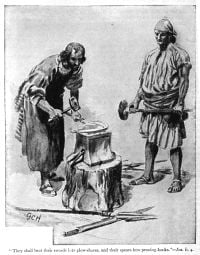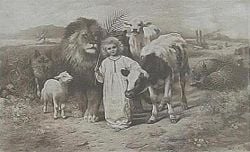Book of Isaiah
| Tanakh Torah | Nevi'im | Ketuvim Books of Nevi'im |
| First Prophets |
|---|
| 1. Joshua |
| 2. Judges |
| 3. Samuel |
| 4. Kings |
| Later Prophets |
| 5. Isaiah |
| 6. Jeremiah |
| 7. Ezekiel |
| 8. 12 minor prophets |
The Book of Isaiah is one of the books of the Hebrew Bible and the Christian Old Testament, traditionally attributed to Isaiah, an eighth century B.C.E. Judean prophet. The book contains some of the most inspiring and most debated passages in the Bible.
In the first 39 chapters, Isaiah prophesies doom for a sinful Kingdom of Judah and for all the nations of the world that oppose God. The last 27 chapters, sometimes called "The Book of Comfort," predict the restoration of the nation and the coming of an era of universal peace under the kingship of the Messiah. This section also contains the "Servant Songs," including the famous Suffering Servant of chapter 53, which is interpreted in very different ways by Jews and Christians. Jews see it as describing the suffering of Israel as a result of its people's sins, while Christians see it as a prediction of Jesus' crucifixion.
Modern scholars tend to think that the second part of the book, also called Deutero-Isaiah, was not written by the historical Isaiah of Jerusalem, but by a later writer or writers active during the Babylonian exile or shortly afterward.
The Book of Isaiah emphasizes that God is not only Israel's Lord, but ultimately the God of all people. It teaches that Israel's mission is to become a "light to the nations," and that the entire world will one day honor God at Jerusalem.
Content
Although the Book of Isaiah is most famous for its inspiring description of the "peaceable kingdom" of the Messiah, its 66 chapters consist primarily of prophecies against Babylon, Assyria, Philistia, Moab, Syria, Israel (the northern kingdom), Ethiopia, Egypt, Arabia, and Phoenicia. These prophecies may be summarized as saying that God is the God of the whole earth, and that nations which think of themselves as secure in their own power may well be conquered by other nations, at God's command.
The judgments, however, are not only against those who persecute Isaiah's own nation, Judah. Chapters 1-5 and 28-29 prophesy judgment against Judah itself. Judah thinks it is safe because of its covenant relationship with God. However, God tells Judah (through Isaiah) that the covenant cannot protect them when they have broken it by idolatry, the worship of other gods, and by acts of injustice and cruelty, which oppose God's law.
The book is by no means limited to prophecies of judgment, however. Chapter 6 describes Isaiah's call to be a prophet of God, rivaling only that of Ezekiel in its dramatic detail. Chapters 35-39 provide historical material about King Hezekiah and his triumph of faith in God. Chapters 9, 11, and 60 contain much-quoted prophesies concerning the glories of the Messiah's kingdom. Chapters 24-34, are also primarily prophecies of the Messiah, described a Davidic king anointed by God, who emerges to lead the "remnant" of Israel and Judah. Under his rule, justice and righteousness will reign, and rebellious nations will be subjugated without mercy.
The prophecy continues with what some have called “The Book of Comfort,” which begins in chapter 40. It details primarily with the period of the Babylonian exile, which began a century after Isaiah's death. This section is considered by modern scholars to be part of the so-called "Deutero-Isaiah," composed during or shortly after the Babylonian captivity and later edited into the authentic prophecies of the historical Isaiah.
In the first eight chapters of this section, Isaiah prophesies the deliverance of the Jews from the hands of the Babylonians and restoration of Israel as a unified nation in the land promised to them by God. The book reaffirms that the Jews are indeed the chosen people of God (chapter 44) and that Yahweh is the only true God of the universe, who will show his power over the gods of Babylon in due time (chapter 46). The Persian ruler Cyrus is named as the person of power, literally a messiah, who will overthrow the Babylonians and allow the return of Israel to their original land (chapter 45). Found here, too, are the famous "Servant Songs," including the Suffering Servant of Isaiah 53.
Subsequent chapters (65 & 66) return to the theme of the judgment of false worshipers and idolaters. The book ends with a message of hope of a righteous ruler who extends salvation to his righteous subjects living in the Lord’s kingdom on earth.
Themes
Isaiah is often concerned with the connection between worship and ethical behavior. One of his major themes, share for example with Amos and Hosea, is God's refusal to accept the ritual worship of those who are treating others with cruelty and injustice. Like other prophetic works, the Book of Isaiah frequently denounces idolatry, which was common at the time.
An important theme in the book is that God is the God of the whole earth. Unlike earlier prophets who portrayed Yahweh as Israel's god to the exclusion of all others but did not necessarily deny that other gods existed for other nations, Isaiah's deity is conceived as the only true God, and the God of all humankind, not just the Israelite nation. Ultimately, no one can defeat God. If God's people suffer defeat in battle, or even if their entire nation has been destroyed and taken into exile, it is only because God permits it to happen, as a punishment for their sin. Furthermore, God is concerned with more than the Jewish people. He has called Judah and Israel his covenant people for the specific purpose of teaching the world about him.
The Book of Isaiah is best known, however, for its theme of the establishment of God's kingdom on earth, with rulers and subjects who strive to live by the will of God. Isaiah's prophecies of the messianic kingdom are among the most-quoted in the Bible, known most famously from Handel's Messiah and also many literary works. The book describes God's kingdom as not only for the Jews, but also for the Gentile nations. However, it is clear that Jerusalem and the Jewish people are to be central in its rule:
- Foreigners will rebuild your walls, and their kings will serve you.
- Though in anger I struck you [Jerusalem], in favor I will show you compassion.
- Your gates will always stand open, they will never be shut, day or night,
- so that men may bring you the wealth of the nations…
- The sons of your oppressors will come bowing before you; all who despise you will bow down at your feet
- and will call you the City of the Lord, Zion of the Holy One of Israel.
- No longer will violence be heard in your land, nor ruin or destruction within your borders,
- but you will call your walls Salvation and your gates Praise (Isaiah 60:10-18).
Historical setting of Isaiah

The historical prophet Isaiah lived during the late eighth and early seventh centuries B.C.E., which was a difficult period in the history of Jerusalem. The Book of Isaiah preserves his words during the reigns of four kings: Uzziah (also known as Azariah), Jotham, Ahaz, and Hezekiah. According to tradition, Isaiah was martyred during the reign of Manasseh, who came to the throne in 687 B.C.E.
The historical Isaiah was not primarily a prophet of hope. He lived during a time of terrible military and political upheavals, which witnessed Israel and Judah allying with pagan neighbors and even warring against each other.
Isaiah prophesied to King Ahaz of Judah that the northern alliance of Israel and Syria would not prevail against him (Isa. 7-8). Nevertheless, God would surely punish Judah if it did not turn to God. The agent of God's wrath would be the rising power of the Assyria.
Indeed, in 722 B.C.E., the northern kingdom of Israel was completely overrun and many of its citizens taken into exile in the Assyrian Empire. Later, Sennacherib of Assyria conquered nearly all of Judah, capturing all of its major towns except Jerusalem and exiling many Judeans as well. Thus, an important theme for Isaiah is the idea of a "remnant" of faithful believers who would endure the current trials and witness the day of redemption when a powerful Judean king of the Davidic lineage would lead them to victory.
In that day the Root of Jesse [King David's father] will stand as a banner for the peoples… He will raise a banner for the nations and gather the exiles of Israel… Ephraim will not be jealous of Judah, nor Judah hostile toward Ephraim. They will swoop down on the slopes of Philistia to the west; together they will plunder the people to the east. They will lay hands on Edom and Moab, and the Ammonites will be subject to them (Isa. 11:10-14).
Isaiah's most dramatic success, according to the biblical account, came during the reign of King Hezekiah. When Sennacherib was in the process of besieging the major Judean city of Lachish and his armies threatened the capital of Jerusalem, Isaiah counseled Hezekiah not to capitulate:
Out of Jerusalem will come a remnant, and out of Mount Zion a band of survivors. The zeal of the Lord Almighty will accomplish this. Therefore this is what the Lord says concerning the king of Assyria: "He (Sennacherib) will not enter this city or shoot an arrow here. He will not come before it with shield or build a siege ramp against it. By the way that he came he will return; he will not enter this city," declares the Lord (Isa. 37:32-34).
A story preserved in Isaiah 37 (as well as 2 Kings 19 and 2 Chronicles 32) relates that an angel of the Lord then smote the Assyrian army, forcing it to withdraw from Jerusalem. However, the account in Kings also admits that Hezekiah, in an effort to assuage Assyria, had sought to bribe Sennacherib, sending him a note of abject apology, saying: "I have done wrong. Withdraw from me, and I will pay whatever you demand of me." The account goes on to say "the king of Assyria exacted from Hezekiah king of Judah three hundred talents of silver and thirty talents of gold. So Hezekiah gave him all the silver that was found in the temple of the Lord and in the treasuries of the royal palace" (2 Kings 18:13-16). In a rare confirmation of a biblical account from another historical source, Sennacherib himself recorded his own version of the story, preserved in the Taylor prism.
Soon after, Hezekiah fell ill, and Isaiah foretold his imminent death (Isa. 38). Hezekiah then prayed desperately to God for deliverance. Isaiah, instructing that a poultice of figs be applied to Hezekiah's infected boil, declared that God had added 15 years to his life. Not only that, but because of Hezekiah's determination to act as God wishes, God would protect Jerusalem from the Assyrians.
Both Jewish and Christian apocryphal traditions state that after Hezekiah's death, Isaiah became a martyr to Hezekiah's son, King Manasseh of Judah, who had liberalized Hezekiah's religious policy and considered Isaiah a thorn in his side.
Authorship

One of the most critically debated issues in Isaiah is the proposition that it may have been the work of more than a single author. Scholars suggest two or three main authors (Original Isaiah, Deutero-Isaiah, Trito-Isaiah), with minor additions by other writers also suggested.
The general objections to single authorship of the book of Isaiah are as follows:
- Anonymity. Isaiah’s name, which is used frequently in the first part of the book suddenly disappears from chapter 40-66.
- Style. There is a sudden change in the mood, theme, and style, after chapter 40.
- Historical Situation. Similarly, the first portion of the book of Isaiah speaks of impending judgment, whereas the later portion of the book discusses God's mercy and restoration, as though the Babylonian exile were an established reality. These sections must have been written during the exile or later, more than a century after Isaiah's death.
- Supernaturalism. "Second Isaiah" presupposes an intimate knowledge of future events such as the name of Cyrus the Great Persia, his action to restore the Jews to Jerusalem, and so on.
Generally, the prophecies of the early sections of the book are considered the work of the historical Isaiah, also called "Isaiah of Jerusalem." The later sections are considered to be the work of a writer or writers known as "Deutero-Isaiah" during the period of the Babylonian exile of the sixth century B.C.E. A third Isaiah is also posited, again possibly including more than one writer, from the period shortly after the exile had ended and the Jews had begun returning to Jerusalem.
It is notable that contemporary Catholic tradition does not insist on the single author view. An introduction to the book in the authorized New American Bible,[1] characterizes the book as a collection of prophecies and poems composed by Isaiah, with additional material, both narrative and prophetic, added by later disciples of the prophet. Both Conservative and Reform Judaism have likewise accepted the historical-critical view as one valid way of approaching this scripture.
Those Jews and Christians who reject historical-critical methods of biblical study insist that the book's author is Isaiah himself. Some do admit to later scribal editing or that the book itself was not compiled by Isaiah, whose prophecies were collected and combined only later into their present form.
Isaiah in Jewish and Christian tradition
The Book of Isaiah plays a significant role in both Jewish and Christian traditions. However, Jews generally understand the book as referring to the times in which it was written and the still-to-come messianic age, while Christians emphasize the passages which they believe refer to Jesus.
Matthew's Gospel sees Isaiah's prophecy of the child Immanuel as being fulfilled in the Virgin Birth of Jesus. "The virgin will be with child and will give birth to a son, and they will call him Immanuel"—which means, "God with us" (Matt. 1:23). Jews are quick to point out the term translated as "virgin" in this passage (amah) is better understood as meaning "young woman." Moreover, in Jewish tradition, Immanuel himself was clearly born in Isaiah's own time as a sign to King Ahaz of Judah that his military troubles would be ended: "Before the boy knows enough to reject the wrong and choose the right, the land of the two kings you dread will be laid waste" (Isa. 7:13-16).
John the Baptist echoes one of the Book of Isaiah's prophecies (Isa. 40:3) in declaring his own mission. "This is he who was spoken of through the prophet Isaiah: A voice of one calling in the desert, 'Prepare the way for the Lord, make straight paths for him'" (Matt. 3:3). Jesus himself begins his public ministry in Nazareth, according to Luke's account, by quoting a passage from Isaiah 61 (Luke 4:16-20):
- The Spirit of the Lord is on me, because he has anointed me to preach good news to the poor.
- He has sent me to proclaim freedom for the prisoners and recovery of sight for the blind
- to release the oppressed, to proclaim the year of the Lord's favor.
New Testament writers often refer to Isaiah to explain how Jesus fulfilled prophecy: Matthew states no less that four times (4:14, 8:17, 12:17, 13:14) that a certain event in Jesus' life happened in order: "To fulfill what was said through the prophet Isaiah." The twelfth chapter of John's Gospel refers three times to the Book of Isaiah. In Acts 8, the Holy Spirit guides the evangelist Philip to witness to an influential Ethiopian eunuch who is reading Isaiah. And finally, Saint Paul refers several times to Isaiah's writings in his letter to the Romans.
The Suffering Servant
Romans 10:16 constitutes the earliest mention in Christian sources of Isaiah's Suffering Servant prophecy: "Not all the Israelites accepted the good news. For Isaiah says, 'Lord, who has believed our message?'" Later Christians would interpret a longer passage from Isaiah 53 in a different sense, as referring specifically to Jesus' atoning death for sin:
Who has believed our message and to whom has the arm of the Lord been revealed? He grew up before him like a tender shoot, and like a root out of dry ground. He had no beauty or majesty to attract us to him, nothing in his appearance that we should desire him. He was despised and rejected by men, a man of sorrows, and familiar with suffering… Surely he took up our infirmities and carried our sorrows, yet we considered him stricken by God, smitten by him, and afflicted. But he was pierced for our transgressions, he was crushed for our iniquities; the punishment that brought us peace was upon him, and by his wounds we are healed (Isa. 53:1-5).
For the disciples of Jesus, the death of their hoped-for Messiah was strongly disillusioning (Luke 24:21). Isaiah 53, interpreted as predicting Jesus' death, soon became a source of inspiration to these earliest believers as they came to see the crucifixion as God's intended plan from the beginning.
Jews, on the other hand, see the Servant poems (which constitute several chapters of Deutero-Isaiah) as generally referring to Israel itself: "You are my servant, Israel, in whom I will display my splendor" (Isaiah 49:3). Rather than speaking of the Messiah, these passages are thus understood to describe Israel's suffering during her exile, during which time she became a laughing stock, and was "despised and rejected by men… familiar with suffering… stricken by God, smitten by him, and afflicted." Throughout the Book of Isaiah, the prophet warns that Israel and Judah would be punished by God for the sins of the people and even destroyed their iniquities. Yet these passages gave hope to the Jews that one day the nation's sufferings would one day end, as they would return to Jerusalem, rebuild their Temple, and eventually regain their political independence through the Messiah—a literal king of Davidic lineage.
| Preceded by: Kings |
Hebrew Bible | Followed by Jeremiah |
| Preceded by: Song of Songs |
Protestant Old Testament | |
| Preceded by: Sirach |
Roman Catholic Old Testament | |
| Eastern Old Testament |
Notes
- ↑ Introduction to the Book of Isaiah United States Conference of Catholic Bishops. Retrieved December 28, 2018.
ReferencesISBN links support NWE through referral fees
- Blenkinsopp, Joseph. A History of Prophecy in Israel. Louisville, KY: Westminster John Knox Press, 1996. ISBN 0664256392
- Childs, Brevard S. Isaiah. Westminster John Knox Press, 2000. ISBN 0664221432
- Heschel, Abraham. The Prophets. New York: Harper Perennial Modern Classics, 2001. ISBN 0060936991
- Motyer, J.A. The Prophecy of Isaiah: An Introduction & Commentary. London: InterVarsity Press, 1993. ISBN 0830815937
- Podhoretz, Norman. The Prophets: Who They Were, What They Are. New York: Free Press, 2002. ISBN 0743219279
External links
All links retrieved November 18, 2023.
- Book of Isaiah. www.mechon-mamre.org
- Isaiah with Rashi's commentary. www.chabad.org
- Various versions of Isaiah. www.biblegateway.com
| |||||||||||||||||
Credits
New World Encyclopedia writers and editors rewrote and completed the Wikipedia article in accordance with New World Encyclopedia standards. This article abides by terms of the Creative Commons CC-by-sa 3.0 License (CC-by-sa), which may be used and disseminated with proper attribution. Credit is due under the terms of this license that can reference both the New World Encyclopedia contributors and the selfless volunteer contributors of the Wikimedia Foundation. To cite this article click here for a list of acceptable citing formats.The history of earlier contributions by wikipedians is accessible to researchers here:
The history of this article since it was imported to New World Encyclopedia:
Note: Some restrictions may apply to use of individual images which are separately licensed.


